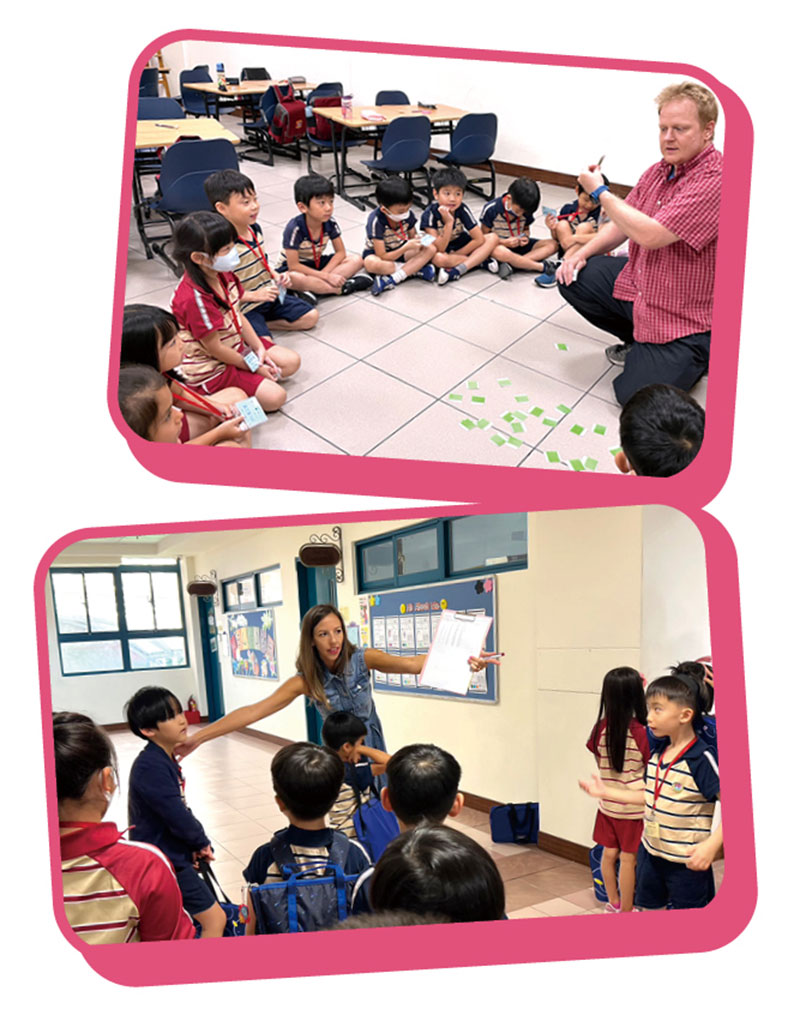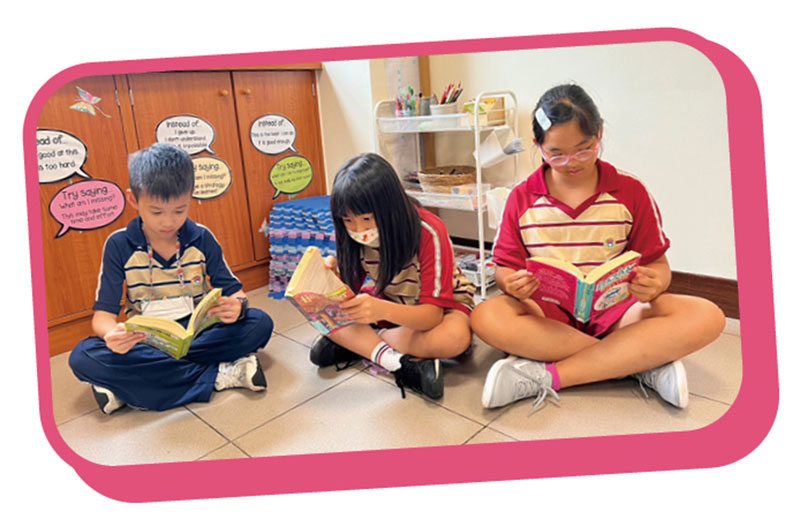

~ Amber Chen
Teaching Coordinator
The summer break has wound down, and the school hallways and playground once again resonate with familiar sounds and laughter. As you stroll through the campus, you'll stumble upon cozy spots where students engage in activities that ignite their curiosity and creativity. But that's not all; as you explore further, you'll encounter clusters of students engaged in conversations, sharing discoveries and planning their next learning adventure. With the right guidance, students can pave the way for a future filled with academic achievement and personal growth.
Preparing Students for a Learning Journey
For our youngest learners, the new school year may bring both excitement and uncertainty. During the transition camp in August, teachers utilized play-based learning, engaging activities, and storytelling to familiarize students with their new surroundings. The adventure began with a campus tour, where teachers introduced the facilities and the playgrounds they would enjoy during classes and breaks to ease any anxieties about the new environment.
Over the summer, teachers also worked diligently to create warm and inviting spaces where students can feel comfortable and curious. Some teachers proudly showcased their students' work, fostering a sense of pride and accomplishment while contributing to a positive and stimulating learning environment. In addition, others had meticulously planned their lessons, decorated the classroom with the upcoming projects, or created an interactive wall to inspire students’ learning. These efforts collectively ensure that our youngest learners are well-prepared to embark on this exciting journey of growth and discovery.

Establishing Consistent Routines
As students move up a grade or even step into their very first classroom, it's a time of new beginnings, and it's quite normal to have butterflies in their stomachs. Teachers dedicate themselves to crafting daily schedules that allocate specific times for assignments, breaks, and engaging activities. These routines instill a sense of security in students, providing a clear roadmap for what each day holds. This predictability works wonders in reducing anxiety and enhancing students' ability to concentrate. Additionally, homework assignments are regularly posted onto the E-Communication Book. Students learn to follow their daily routines and develop a sense of responsibility. They understand the importance of punctuality and organization, and learn to prioritize their tasks, manage their time effectively, and develop a strong work ethic.
Fostering a Love for Reading
Building upon foundational learning skills, reading serves as the gateway to the next level of educational growth for students. Teachers craft reading zones within their classrooms stocked with books curated to match each student's unique interests. During the "Hooked-on Books" time, teachers take on the role of literary guides, recommending books tailored for both individual and group reading. With boundless options, students are encouraged to embark on reading adventures that span a spectrum from gripping fiction to enlightening non-fiction, to expand their vocabulary and challenge their reading levels. As the school has started, it's common to encounter returning students nestled in corners across the campus, book in hand, delving into their chosen worlds. This inspiring atmosphere nurtures a lifelong reading habit, transforming students into explorers of words and ideas.

With grade reshuffling, some students may find themselves facing unfamiliar subjects or topics. No matter the challenges, teachers are well-prepared to help students catch up and adapt to the new curriculum. Asking for assistance is a path to surmounting obstacles. As the school year unfolds, let's embark on this adventure together, ensuring that every student's potential is nurtured and celebrated. Together, we'll write a story of triumph and growth in the captivating chapters of their educational journey.
From the Editor
Set Up Students for Success
國際處主任 賴國宜
Students have already been back to school for two weeks. It's important to assess how well your child has adjusted to the new school year. All parents desire a successful school year for their children, but sometimes it can be hard to know where to begin. Firstly, I would like to recommend you switching up those fun vacation late nights for early mornings. A consistent sleep schedule can significantly impact your child's readiness for the school day. Next, set and adhere to a daily routine as consistently as possible. This daily routine should also include dedicated time for homework and reviewing schoolwork in a distraction-free environment. Moving up to a new grade means more new and challenging learning tasks. Engaging in conversation with your children about teachers' expectations regarding behavior and grading standards can be beneficial. This will help with their adjustment to the new class easier and also give them a sense of security.
Success in school is a collaborative effort between the home and the school. The parent-teacher conference will be held on September 16. We sincerely invite all parents to join us. We appreciate your continuous support and look forward to meeting you.
經過兩個月的假期,再度回到校園,您的孩子已經完全適應了嗎?還是仍過著晚睡、早上起不來、跳過早餐的假日生活模式?調整正常作息是順利適應新學習環境的重要關鍵,除了早睡早起,營養健康的飲食也很重要,有了足夠的睡眠和均衡的飲食,才會有充沛的活力,有效率的學習。每一個學年的開始都是一場嶄新的學習旅程,不同階段會有新的學習目標,陪孩子聊聊這兩週來課堂學習的狀況,了解新老師的期待和作業安排模式,與孩子一起建立固定作息,養成按時複習和做作業的習慣,可以幫助他們在隔天的課堂更容易理解並融入學習活動,進而提升學習成效。如果您想多了解如何幫助孩子適應新年級的學習任務,推薦您閱讀教學組長Ms. Amber的文章。成長是一個不斷嘗試和進步的過程,有了父母的陪伴和支持,孩子會更有信心向前邁步。
本學期的班親會將在9月16日舉辦,誠摯邀請所有的家長共襄盛舉,除了中外師一起與家長座談,國際處也安排各年級的Kang Chiao Future Skills課程說明會,歡迎家長們利用空檔自由參加。家長和學校攜手合作,相信我們會有更美好、豐收的一年。